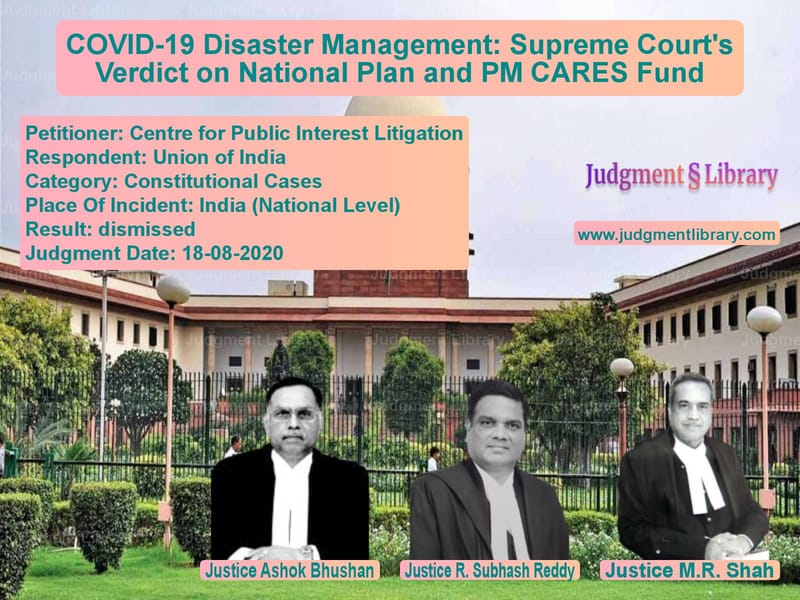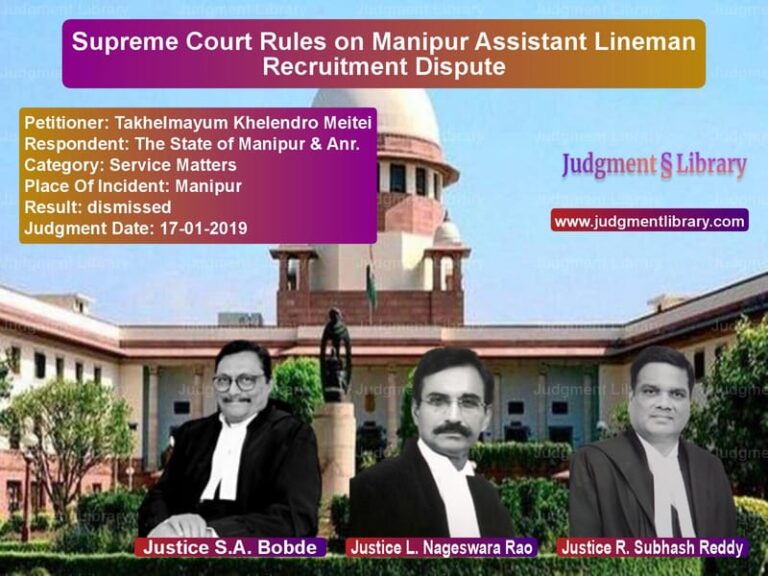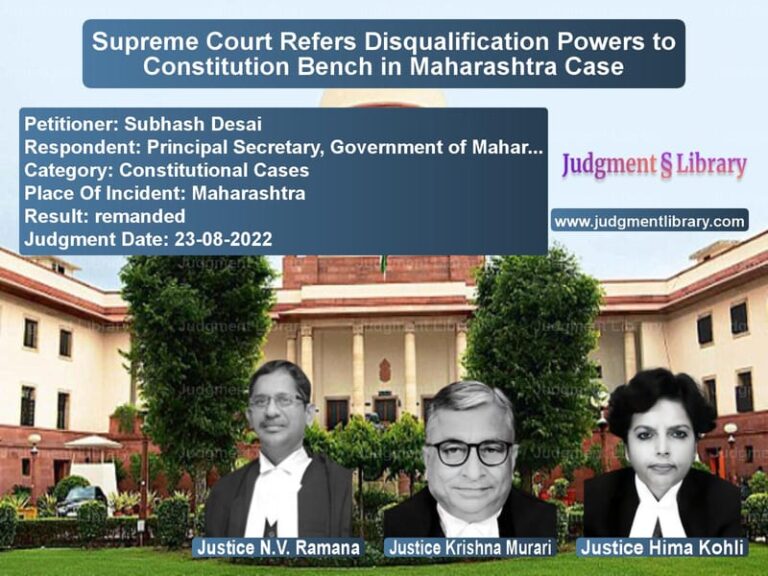COVID-19 Disaster Management: Supreme Court’s Verdict on National Plan and PM CARES Fund
The Supreme Court of India, in its judgment dated August 18, 2020, ruled on a significant public interest litigation (PIL) filed by the Centre for Public Interest Litigation (CPIL) against the Union of India. The case revolved around the preparedness of the Indian government in managing the COVID-19 pandemic and the role of the National Disaster Response Fund (NDRF) versus the PM CARES Fund.
The petitioner sought directions for the Union of India to implement a comprehensive National Disaster Management Plan specific to COVID-19, ensure minimum standards of relief under the Disaster Management Act, 2005, and transfer all contributions from the PM CARES Fund to the NDRF.
Background of the Case
The case arose during the peak of the COVID-19 pandemic, where concerns were raised about the adequacy of India’s disaster management framework. The primary contentions included:
- The lack of a dedicated national plan for managing the pandemic.
- Non-utilization of the NDRF for pandemic relief.
- Alleged diversion of public donations to the PM CARES Fund instead of the statutory NDRF.
The petitioner argued that the Union of India had failed to meet its obligations under the Disaster Management Act, 2005, and sought judicial intervention.
Petitioners’ Arguments (Centre for Public Interest Litigation)
The CPIL contended that:
- The National Disaster Management Plan of 2019 did not specifically address COVID-19.
- The government was obligated under Section 11 of the Disaster Management Act to prepare a pandemic-specific national plan.
- Minimum standards of relief under Section 12 were not adequately defined for COVID-19.
- The government should utilize the NDRF for pandemic relief instead of directing funds to the PM CARES Fund.
- All contributions made to the PM CARES Fund should be transferred to the NDRF for transparency and audit by the Comptroller & Auditor General (CAG).
Respondents’ Arguments (Union of India)
The Union of India, represented by the Solicitor General, countered the claims by arguing that:
- The National Disaster Management Plan, 2019, covered all disasters, including biological disasters like COVID-19.
- Section 12’s minimum standards of relief were already in place and applied to all disasters.
- The government had already allocated Rs. 11,092 crore from the State Disaster Risk Management Fund (SDRMF) for COVID-19 relief.
- The PM CARES Fund was a public charitable trust created to supplement government efforts and was distinct from the NDRF.
- There was no statutory requirement to transfer donations from the PM CARES Fund to the NDRF.
Supreme Court’s Observations
The Supreme Court examined the legality of the government’s actions under the Disaster Management Act and made key observations:
- The 2019 National Disaster Management Plan sufficiently covered pandemic preparedness, making a separate COVID-19 plan unnecessary.
- The government was within its rights to utilize the SDRMF for pandemic-related expenses.
- The NDRF was available for COVID-19 relief, but its usage was at the government’s discretion.
- The PM CARES Fund was a separate public charitable trust, and there was no legal basis to transfer its funds to the NDRF.
Important Verbatim Observations by the Supreme Court
“The Disaster Management Act, 2005, does not contemplate a separate plan for each disaster. The 2019 National Plan sufficiently covers pandemics, including COVID-19.”
“The utilization of funds, whether from the NDRF or the PM CARES Fund, is a policy decision. The judiciary cannot interfere with financial planning undertaken by the executive.”
Final Verdict
The Supreme Court ruled that:
- There was no need for a separate national plan for COVID-19.
- The government’s relief measures under SDRMF were valid.
- The NDRF could be utilized at the government’s discretion, but there was no obligation to do so.
- The PM CARES Fund was a voluntary public trust, and there was no legal mandate to transfer its funds to the NDRF.
- The writ petition was dismissed.
Impact of the Judgment
This ruling has significant implications:
- It reaffirms the primacy of executive discretion in financial planning during disasters.
- It upholds the autonomy of public charitable trusts like the PM CARES Fund.
- It clarifies that a general disaster management plan can cover multiple types of emergencies.
- It sets a precedent for future cases involving disaster response funding.
The Supreme Court’s decision ensures that government policies in disaster management remain within the legal framework while balancing the need for financial transparency.
Petitioner Name: Centre for Public Interest Litigation.Respondent Name: Union of India.Judgment By: Justice Ashok Bhushan, Justice R. Subhash Reddy, Justice M.R. Shah.Place Of Incident: India (National Level).Judgment Date: 18-08-2020.
Don’t miss out on the full details! Download the complete judgment in PDF format below and gain valuable insights instantly!
Download Judgment: Centre for Public In vs Union of India Supreme Court of India Judgment Dated 18-08-2020.pdf
Direct Downlaod Judgment: Direct downlaod this Judgment
See all petitions in Public Interest Litigation
See all petitions in Fundamental Rights
See all petitions in Legislative Powers
See all petitions in Judgment by Ashok Bhushan
See all petitions in Judgment by R. Subhash Reddy
See all petitions in Judgment by Mukeshkumar Rasikbhai Shah
See all petitions in dismissed
See all petitions in supreme court of India judgments August 2020
See all petitions in 2020 judgments
See all posts in Constitutional Cases Category
See all allowed petitions in Constitutional Cases Category
See all Dismissed petitions in Constitutional Cases Category
See all partially allowed petitions in Constitutional Cases Category







